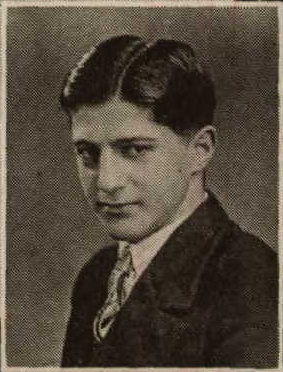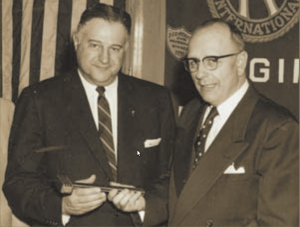Adolph Bernstein (1908)
| Adolph Bernstein | |
|---|---|
 | |
| Born |
December 30, 1908[1] Elgin, IL (?) |
| Died |
November 24, 1992 (aged 83)[2] Deerfield Beach, Broward, Florida[3] |
| Spouse | Sylvia _____ |
| Children | Eugene Bernstein |
Overview
"Adolph Bernstein’s life portrays the rich and valued participation of Jewish individuals in post-World War II Elgin. Bernstein, a member of the YMCA’s Board of Directors, chaired the publicity efforts for a fundraising campaign that supported a new building. He managed Fin ‘n Feather Farm and its popular Milk Pail Restaurant while helping lead his synagogue, the Community Chest, the Association of Commerce, St. Joseph’s Hospital, the Elgin Association for the Crippled, the Fox Valley Mental Health Society and the Kiwanis Club. When Elgin faced its biggest political question in the 1950s - the form of city government - leaders on both sides were Adolph Bernstein and Ben Rifken, native Elginites and sons of immigrant Jews.
"The immigrant parents of Adolph Bernstein and Ben Rifken had found Elgin a good place to raise Americans. Many Jews settled in Elgin as families in a community of diversity with strong public schools and people who valued them. Their children engaged with other Elgin kids in scouting or sports at the YMCA. Elgin was a springboard into American life for such people as Irene Wirtschafter, Marshall Goldman and Bobby Rosengarden."[4]
Role in Shaping Elgin's City Government
"In the fall of 1953, petitions were circulated calling for a referendum on the changeover. Elginites for City Manager, later known as Elginites for Council-Manager, was formed under the leadership of Attorney William W. Brady, Anita Connor, who was active in the League of Women Voters, and Adolph Bernstein. This group campaigned for a favorable vote. The incumbent mayor, Myron M. Lehman, then serving his fourth term, and his supporters opposed the change. They maintained that 'the American ideal of government means full-time representation, not part-time councils; government by the peoples' representative, not a one-man appointee...' ECM charged that 'We are driving an old car with gas pedals and no brakes.'
"On April 6, 1954, voters approved the plan by a relatively close margin, 5,905 to 5,105, and Elgin became the first commission-form city in Illinois to adopt the managerial option by referendum. The decision in this segmented industrial city was far less conclusive than in a residential, one-class suburb like Highland Park, where the council-manager plan was voted in by a margin of 3,754 to 81 in December of the same year."[5]
Historical Records
- 1930 census: Age 21, boarding with the Tubins in Chicago[6]
Notes
- ↑ http://search.ancestry.com/cgi-bin/sse.dll?rank=1&new=1&MSAV=0&msT=1&gss=angs-g&gsfn=adolph&gsln=bernstein&msddy=1990&msdpn__ftp=Elgin,+Cook,+Illinois,+USA&uidh=uv6&mssng0=sylvia&mscng0=eugene&pcat=ROOT_CATEGORY&h=4480345&recoff=14+15&db=ssdi&indiv=1
- ↑ http://search.ancestry.com/cgi-bin/sse.dll?rank=1&new=1&MSAV=0&msT=1&gss=angs-g&gsfn=adolph&gsln=bernstein&msddy=1990&msdpn__ftp=Elgin,+Cook,+Illinois,+USA&uidh=uv6&mssng0=sylvia&mscng0=eugene&pcat=ROOT_CATEGORY&h=4480345&recoff=14+15&db=ssdi&indiv=1
- ↑ http://search.ancestry.com/cgi-bin/sse.dll?rank=1&new=1&MSAV=0&msT=1&gss=angs-g&gsfn=adolph&gsln=bernstein&msddy=1990&msdpn__ftp=Elgin,+Cook,+Illinois,+USA&uidh=uv6&mssng0=sylvia&mscng0=eugene&pcat=ROOT_CATEGORY&h=4480345&recoff=14+15&db=ssdi&indiv=1
- ↑ http://www.elginhistory.org/jewish_site_html/images/jewish_exhib_brochure.pdf
- ↑ http://www.elginhistory.com/eaah/eaah-ch09.htm
- ↑ http://search.ancestry.com/cgi-bin/sse.dll?rank=1&new=1&MSAV=0&msT=1&gss=angs-g&gsfn=adolph&gsln=bernstein&msbdy=1908&msbpn__ftp=Illinois,+USA&msbpn=16&msbpn_PInfo=5-%7C1652393%7C2%7C3247%7C16%7C&msddy=1992&msdpn__ftp=Broward+County,+Florida,+USA&msdpn=384&msdpn_PInfo=7-%7C1652393%7C2%7C3245%7C12%7C384%7C&uidh=uv6&mssng0=sylvia&pcat=ROOT_CATEGORY&h=24646079&recoff=5+6&db=1930usfedcen&indiv=1
